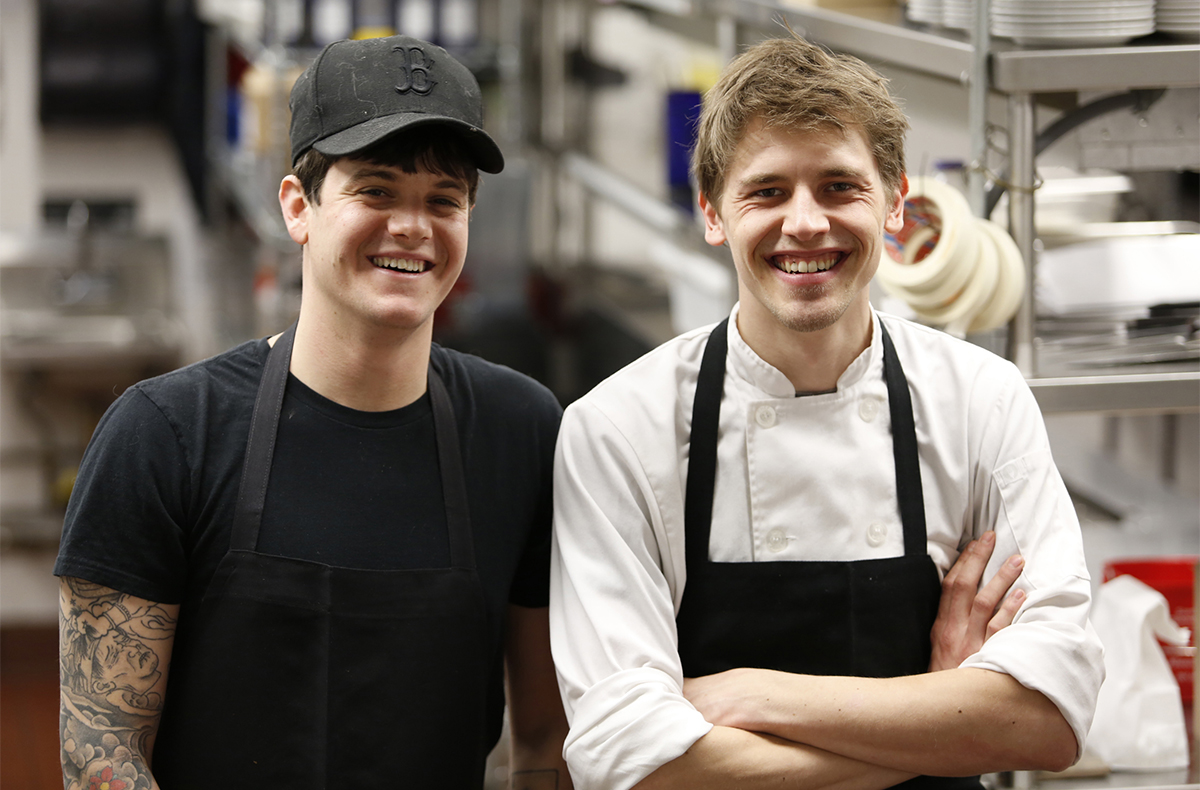A Fresh Start: Behind Whisk’s Kitchen Training Program

Chefs Jeremy Kean (left) and Philip Kruta of Whisk.
There’s more to Whisk then you could ever imagine. The former pop-up restaurant run by chefs Jeremy Kean and Philip Kruta is all about showcasing the avant-garde as evidenced by their first menu at Wink & Nod, where the two have taken up residence. You’ve never seen bar fare like this: duck meatballs with foie gras, whole trout, and squid ink pasta with baby octopus.
“Phil [Kruta] and I talk about food and we read as much as we possibly can,” says Kean. “We’re very inspired and passionate about what we’re doing and our food is very well-received, but in the underbelly of what we do is this project that’s been transforming and evolving.”
Whisk’s contribution to the local dining scene involves much than just French techniques and progressive presentations, however. Shaped by Kean’s own experience inside the New Jersey State Prison in Trenton, Kean and Kruta have established a kitchen training program—both within their Whisk pop-ups and as part of their partnership with Wink & Nod—that works with pupils who have all served prison time and are desperate to move on with their lives.
“With the training program at Whisk, we bring in guys that might not get hired anywhere else,” says Kean. “They have this blemish on their résumé and a serious need for a life change. We do our best to bring them onto the team and facilitate their growth. Basically, I meet with them and we talk for an hour or two to try to get a feel for their commitment. They start at the bottom as a half prep/half dishwasher and they get paid just like any other job. Slowly but surely I train these guys and move them up, just like I would anybody. Right now I have two new students and another one who’s been working with me for over two years.” The end goal is to place program graduates at other area restaurants.
Kean has firsthand experience with the rehabilitative powers of cooking and teaching. At 18, he found himself facing up to five years in prison on the charge of possession with intent to distribute. “I was a mess. I found myself doing a short stint of jail time in Trenton, New Jersey, at a maximum-security county jail. As an 18-year old goofy, hippy white kid, I went in there, and I was petrified. I went into a gang unit because I have a lot of tattoos, especially Grateful Dead tattoos. They bring me into this unit with 36 really, really hardened guys, a lot of them transferring to state prisons for murder charges. I thought, ‘yeah, I’m going to die in here,'” he remembers.
Instead, Kean found the experience “enlightening,” with many of his bunkmates becoming friends and confidants. He was never attacked or bullied. In fact, most shared their personal stories with Kean during his four months of time served.
“I was in there with guys who really didn’t have many options,” says Kean. “They were fighting some serious odds to not end up back there. As scared as I was, everyone was super cool. I didn’t have one fight or altercation. Everybody just wanted to get to know me. I heard a lot of stories of where these guys came from and what happens in mass incarceration and what happens once you get out.”
After being released, Kean moved to Southeast Asia and taught cooking classes at an orphanage. He fell in love with teaching and upon returning to Boston, got involved with the Haley House. They parted ways a year ago, but Whisk has continued to screen training program candidates for possible employment.
“I knew I wanted to teach and I loved the demographic. This demographic needs people who are passionate and want to help make a change. When I met Phil and we started Whisk, it made this program a possibility. Now it’s just incorporated into what we do. I hate to say, ‘Yeah, we run this training program; we’re so amazing.’ Because we’re not. We give people a chance that others won’t. That’s it! These guys are just a part of our team.”
Kean is quick to emphasize that his yet-to-be-named training program has yet to accept a donation or grant, but he anticipates starting a non-profit entity within the next two years. His vision for the program involves training, job placement, and even counseling.
“Once I have a space I know we’ll be in for a long time, I’ll hire a chef to take some of my responsibilities and I’ll go off and start the non-profit and really do it,” says Kean. “Right now, I just make sure I have two or three passionate students with me at all time.”
As for his current crop of trainees, Kean says they’re performing beyond his wildest expectations. “I’m teaching as I can, but they’ve literally been thrown into the fire and they’re doing great. These guys did serious time in serious prisons, so they’ve seen a lot worse than a stressed out chef. They’re getting better by the day. I got one kid that just got out of jail three months ago, he’d never been in a kitchen in his life and he’s already standing beside me on the sauté station cooking and plating. Another guy has been with us for over two years and he’s running the prep schedule now for a 100-seat restaurant. That’s incredible!”


